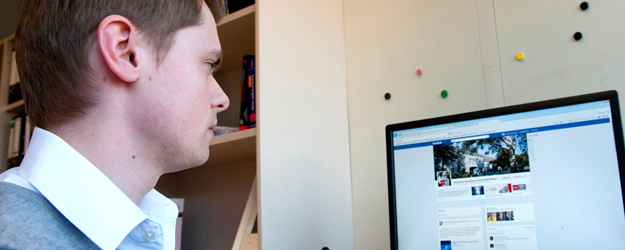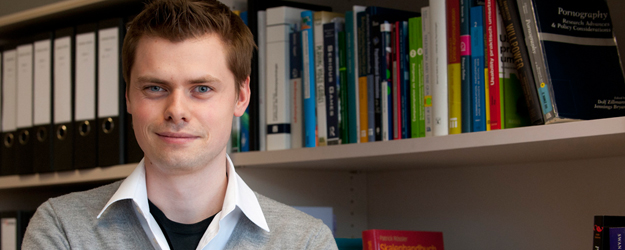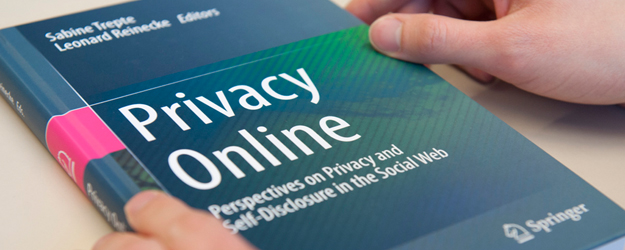23 April 2012
From party photos to relationship status to sexual orientation – self-disclosure in the social web has become part of our everyday lives. But, users rarely make distinctions between good friends, acquaintances or workmates when posting private information. As a result, the 'private sphere' is disappearing. Dr. Leonard Reinecke, Junior Professor at the Institute of Media and Communication Studies at Johannes Gutenberg University Mainz (JGU), has been looking closely at this trend; how are users of social network platforms like Facebook dealing with this problem of self-disclosure and the protection of their private sphere?
The first thing that one notices when entering the office of Junior Professor Dr. Leonard Reinecke are the dirty windows still waiting for a good spring cleaning. "But the view is still great," Reinecke counters. He hasn't been in Mainz very long. The media psychologist joined the Institute of Media and Communication Studies at JGU in February 2012 as a Junior Professor specializing in online communication. He willingly sketches out how he sees the current development of the social web and the future of privacy at a time in which we are constantly sharing our private information.
An attempt to fulfill social needs
Reinecke's research is in tune with the zeitgeist – social media platforms are enjoying immense popularity. Some 800 million people around the world are registered users of Facebook alone. Social motivations, such as the desire to establish social contacts, are important factors that are spurring on communication via the social web. "We want to keep our friends and acquaintances up to date and share our preferences and opinions," Reinecke explains. This constant exchange generates a sense of solidarity. Plus, we keep in touch with important people in our lives, even when they live far away, and we can reach out to lots of people within a very short amount of time. Reinecke points out one of the advantages of social networks: "Users of the social web can achieve an enormous effect with very little effort on their part."
Another factor contributing to the appeal of social media is that these offer the opportunity to play with one's own identity. The social web is like a stage – it has become a site of self-presentation. People share everything publicly – that they're feeling really great at present because they're enjoying the fantastic weather or that they've got a hangover because they enjoyed a few too many brewskies at a party the night before. The disclosure of such private and sometimes quite intimate information has dramatically changed the parameters of the private sphere in the social web. The private has become public and we, as individuals, have become more transparent. As part of the DFG Research Project 'Socialization in the Social Web', Reinecke and his colleagues at Hamburg University investigated why users of the social web disclose so much information about themselves.
The reward principle
What Reinecke found out is that, as he puts it, "the more I tell about myself, the more I profit from it." In other words, whoever posts something is 'rewarded' by feedback and comments, and the more you post, the greater the response you receive. This encourages you to interact, but it restricts your private sphere.
Essentially, we pay for social interaction on social media platforms by surrendering part of our private sphere in return. Quite often, however, users are not aware of this fact. As Reinecke explains, "there is a deceptive feeling of intimacy attached to the social web." You are essentially surrounded by people that you feel you know. "This creates the illusion of privacy, but often when you take a second look, this isn't really the case."
The illusion of privacy
Normally, we have a variety of social relationships with varying degrees of intensity and intimacy – the rich aunt, the best friend or the disagreeable next door neighbor are all treated differently and it is easy for us to keep these groups separate. On the social web, however, these social contexts collapse because all our social groups are mixed together. We deal with all these people in the same way. "Users' posts are aimed at a specific audience, but all Facebook friends can read them, including workmates or casual acquaintances who would not usually be privy to all this personal information," comments Reinecke before summing up: "This private information is thus made available to a very large audience that is not easy to keep track of and, in some cases, this can result in unexpected consequences."
There are settings that allow users to assign their 'friends' to different groups and then choose which groups can see which information, but for many, this process seems to require too much effort. Many users often do not think about the possible consequences of their activities on the social web, for example the fact they are 'paying' social networks with their private information; the platforms analyze this information and then place targeted advertising on each person's page. "Facebook puts a great deal of effort into its user-friendliness and the appearance of transparency, but it is very difficult to trace how the company is using a user's personal data for its own purposes," criticizes Reinecke.
Numerous studies show that the majority of users claim that their private sphere is important to them, but this does not necessarily mean that they are careful about what they choose to disclose and how they share their private information. These users continue to post revealing bikini shots and party photos which can be seen by casual acquaintances or an internet-savvy grandma, among others. Reinecke calls this contradiction a "privacy paradox". This and other phenomena in the area in which social media and private sphere intersect are the subjects of a recently published book, edited by Reinecke and his colleague Sabine Trepte (Hamburg University), and entitled Privacy Online. It contains essays by a number of international researchers who present their take on the private sphere of the social web.
A curse or a blessing?
Of course, Reinecke also has his own Facebook account. But he has no particular urge to make disclosures about himself. "I'm afraid I am one of the more boring Facebook users," he admits with a smile. He uses Facebook more as a means of exchanging professional information with colleagues.
When asked whether social media are a curse or a blessing, he answers: "More a blessing than a curse. Their advantages are fairly obvious. Social media have made possible forms of interaction which simply never would have existed otherwise." That said, however, he adds that we should maintain a critical stance. "We do, of course, need to continue to keep an eye on the way things are developing and investigate the personal and social consequences of use." And, perhaps we should think twice before we post that next bikini shot – after all, the department head might have some feedback of his own to share.



